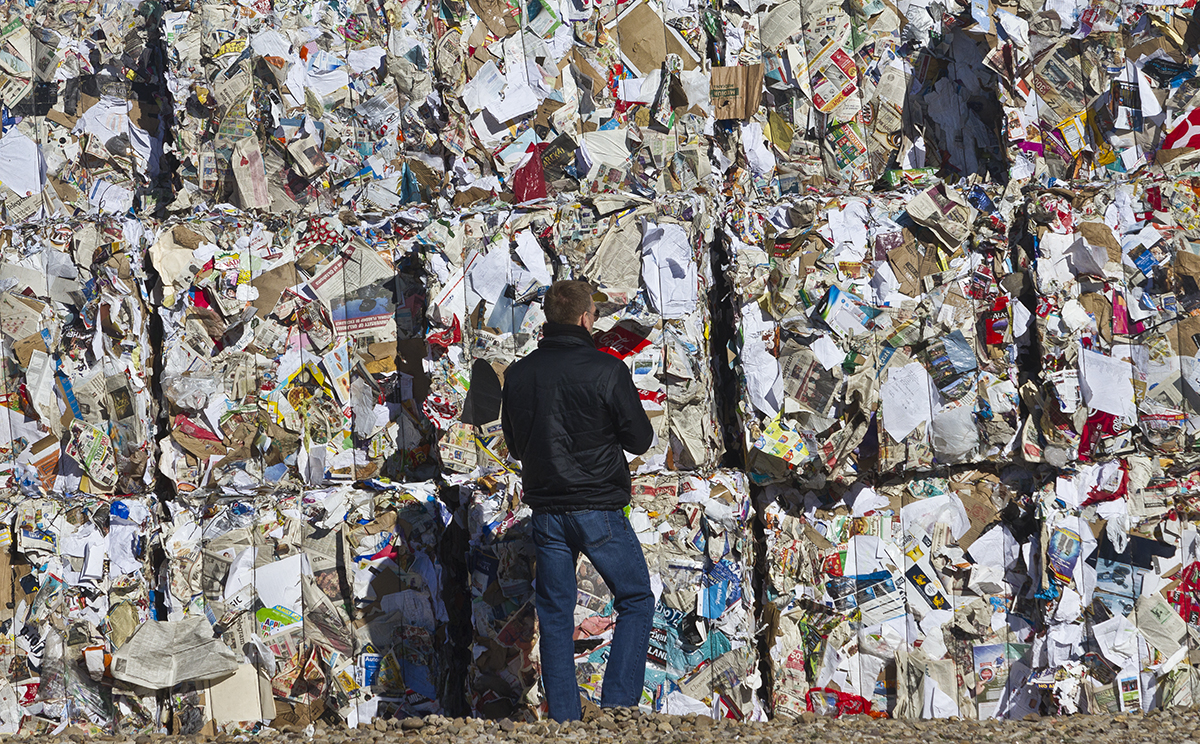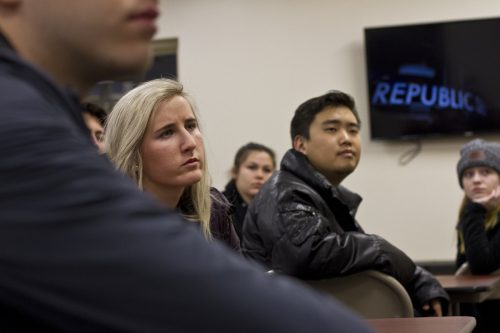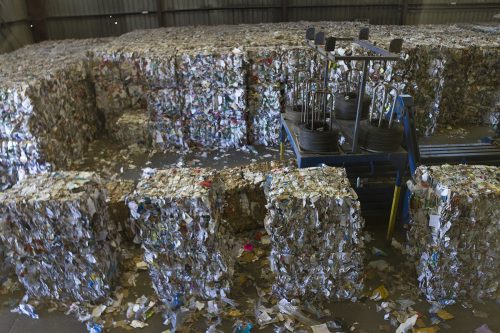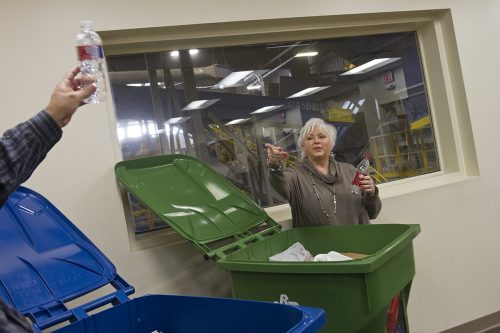
Waste Management Is Key to Preventing Ocean Pollution
Students tackle problematic plastics during Frog Forum.
In welcoming 16 students to the second annual Frog Forum, David Whillock painted a bleak picture of the world’s polluted oceans.
Discarding plastics, he said, could have widespread consequences — from endangering certain species to killing coral reefs. “The oceans are in critical danger,” and plastics are a huge part of why, Whillock said.
Whillock, associate provost and dean of the Academy of Tomorrow, issued a challenge to the students who participated in the forum, held before the start of the spring semester. “Plastic in the ocean is a problem you can do something about,” he said.
Exploring approaches and solutions to tough problems is the central idea behind Frog Forum, a three-day, no-credit academic experience that brings together students from different disciplines to examine a single global issue.
18.2 trillion pounds of plastic has been produced since 1950.
Science Advances
The inaugural Frog Forum in 2017 focused on combating food waste. In the second forum, with input from faculty mentors, four teams of four students looked at ways to rid the world’s oceans of plastic waste.
“There is so much about the oceans we could talk about: rising temperatures in the oceans, the bleaching of the coral reef, how acidity levels are damaging fish,” said Chris Hightower ’94 (EdD ’16), associate director for institutional effectiveness, who helped create Frog Forum. “We also wanted something tangible that the students could do, a problem that they had real potential to solve.”
Diving In
After watching A Plastic Ocean, a 2016 documentary directed by journalist and adventurer Craig Leeson, the students chatted via video with Tanya Streeter, an Austin, Texas-based environmentalist featured in the film.
Of plastics, Streeter asked: “How can a disposable product be made of a material that’s indestructible?”

TCU students saw firsthand what is done at the Republic Services North Texas Recycling Complex in Fort Worth. Photo by Mark Graham
Kenzie Cherniak, a sophomore environmental science major from Austin, said, “Tanya talked to us about simple steps, like not putting your produce in those flimsy plastic bags at the grocery store, which is something I’d never thought about before.”
Also joining the post-screening video chat from the U.K. was Jo Ruxton, the documentary’s producer, who stepped away from a meeting to answer questions from the students. In the film, she introduced the idea of how plastic doesn’t so much “break down” as it does “break up,” resulting in tiny plastic pieces that fish, sea mammals, birds and other marine species often ingest.
Scientists are studying the potential health consequences to humans who eat fish or consume meat from animals whose feed includes fishmeal. As of yet, there are few definitive conclusions about the risks.
Ruxton, a co-founder of the Plastic Oceans Foundation, said such research must continue.
Exploring Solutions
On the first day of this year’s Frog Forum, each team received the same assignment: Create short videos to highlight the problem of plastics in the oceans and offer tangible solutions. The students then headed to the Dallas World Aquarium to shoot video of fish in pristine environments.

Students saw bundles of waste products at the Republic Services North Texas Recycling Complex in Fort Worth. Photo by Mark Graham
That evening, students dined in Dallas’ Trinity Design District at Meddlesome Moth, where chef Robbie Lewis and general manager Ryan Richardson talked about the restaurant’s commitment to eco-friendly practices such as purchasing locally grown produce.
The next morning, the students, each of whom was nominated by a faculty member to participate in the forum, visited the Republic Services recycling center. The Fort Worth facility takes in 500 tons of mixed recyclables every day.
“I couldn’t believe that something as common as a plastic grocery bag can cause such a tremendous problem,” said Emily “EmJ” Hanaway, a junior early childhood education major from Seattle.
Those bags littered the students’ next stop: the Fort Worth Southeast Landfill, which accepts some 4,000 tons of trash each day. Plastic bags floated through the air like balloons, with hundreds snared on the chain-link fence surrounding the location.
“Here in Fort Worth, we generate about 4 pounds of trash per person per day,” said Powell McKee, operations clerk at the landfill. “This site was designed to last for 30 years, but at [the] rate we’re going, we will fill up a lot faster than that. The best thing people can do is recycle — especially plastic.”
Team Effort

Republic Services’ Cheryl Brock discusses recycling with Frog Forum students. Photo by Mark Graham
Armed with new information, perspectives and experiences, the student teams completed their assignments. One team’s video spotlighted the 50 billion plastic water bottles produced in 2017 in the United States. The video suggested a better option: the consistent use of refillable bottles. Another team concentrated on curtailing the use of plastic bags.
“We decided not to use the word ‘bioaccumulation’ in our presentations because we thought it would scare people, but the idea of essentially eating the plastics we are tossing every day is alarming,” said Jean-Paul DeBos, a senior biology and political science major from Plano, Texas.
On the final day, each team made a presentation. The students bookended their work with what they learned along the way and their intentions to continue tackling the issue.
After congratulating the participants on the quality of their work, Provost Nowell Donovan encouraged the students to become “visionaries and missionaries” for reducing waste and improving environmental conditions.
“You are part of the vanguard that will succeed,” Donovan said. “Direct action will have to overcome inertia so you can have a cleaner, better world.”
Donovan flashed a grin at the students. “No pressure!”

Your comments are welcome
Comments
Related reading:
Features
Adam Fung’s Uncommon Arctic Adventure
The art professor is acting as an Arctic ambassador and filmmaker after his 19-day residency in the Far North.
Features
Roxo’s Message on the Panamanian Mangroves
TCU’s student-run strategic communication agency is helping to protect a vital and endangered resource.
Features
Food Justice Class Shines Light on Hunger, Nutrition
Community gardening, interviews and delivering nourishment to food deserts are all part of the curriculum.